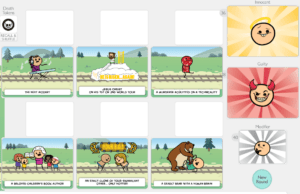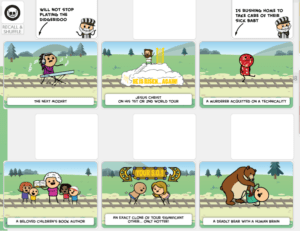For my critical play, I played Trial by Trolley, a card/board game (there is also a free online version that I used) created by Skybound Games and Cyanide and Happiness. The game allows for 3-13 players and is targeted at more mature audiences (since many of the cards allow for the creation of more mature, slightly unhinged jokes) who enjoy storytelling and social games.
Overall, the game embodies the same core mechanics and dynamics that my group and I have created in our game so far. To recap our game, we are creating a card game named Posh Pooch which centers around players drawing accessory cards for their dogs. Players can trade accessories with others up until a prompt card is revealed. Each player’s goal is to convince a judge that their dog best fits the prompt through storytelling. Players can “sabotage” the outfits of other dogs by placing accessories that they did not use on the dogs of other players and can also trade accessory cards with others. Trial by Trolly embodies similar resulting dynamics, specifically in terms of the storytelling and sabotage aspects that result from some of the game mechanics.
In the game, Trial by Trolley, players must convince a conductor (the same role as the judge in our game) to run over the opposing team’s track with the trolley. The way that this is done is by verbally trying to convince the judge that their own team’s track is worth saving. Essentially, each team must emphasize the good things about the people on their track and explain away the bad things about the people on their track. Two main mechanics lead to the storytelling and sabotage dynamics — the fact that your fate is decided by a “judge” and the fact that each track has at least one innocent card (good card) and one guilty card (bad card). The fact that you do not win the game by solid, point-based actions but rather by appealing to an external judge and the fact that your track has both good and bad cards, creates the dynamic of players actively trying to convince the judge that their track is better through the creation of a story. This is especially true because the cards that you draw can be pretty random and disconnected from each other, forcing players to create a common, convincing thread among the cards/people on their track. In Trial by Trolley, this storytelling is a group effort, with all of the players very clearly working together to try and piece together a story and convince the judge that the other team’s track is bad and that their track is better. For example, in the sample of our game below, you can see 2 innocent cards and 1 guilty card. My team’s track contained the murderer. In order to convince the conductor that our track was worth saving, we had to draw sympathy toward our 2 innocent cards and try to convince them that the murder was worth saving more than the deadly bear with a human brain.

This also leads to sabotage as players put modifier cards onto the other team’s track (which is part of the mechanics since it is part of the rules) to make it seem even worse and force them to rethink and re-tell their story/argument or put modifiers on their own track to make their track seem more innocent and worth saving. The fact that you could modify someone’s track added a lot of discussion and really contributed to the storytelling aspect because, for everyone (the judge, the other team, your team), it added a new layer of conflict that people had to quickly think about resolving. Modifiers made the decision about who to kill more complicated, in a good way, because they made “good” cards slightly worse and sometimes made “bad” cards slightly better. As the conductor/judge, it made the moral decision of who to save much blurrier. This in turn creates an extremely prominent aesthetic of fellowship as everyone piggybacks off of each other’s statements to help make their team look good and “roast” and ruin the other team’s track. These aspects of sabotage and storytelling, are dynamics that also result from Posh Pooch which has very similar dynamics as Trial by Trolley when you compare the innocent cards with our “good accessories,” the conductor with our judge, the guilty cards with the “bad accessories,” and the modifiers with our trading + sabotage mechanic.
In Trial by Trolley, people argued and told a story as a very unified and animated team which made the experience funny. This is also what makes Trial by Trolley different from Posh Pooch. Even though Posh Poosh has almost the same mechanics of getting good + bad accessory cards, sabotaging other players, and having to tell a story to convince a judge, it has a much weaker sense of fellowship because every player is trying to individually win. I feel like fellowship is a large part of what made Trial by Trolley chaotic, energizing, and enjoyable and something that we were actively trying to create through Posh Pooch. However, after playing Trial by Trolley, I feel that we could do a better job in our mechanics of forcing fellowship as part of the game. We might take inspiration from Trial by Trolley to make Posh Pooch a more team or partner-based game.

One thing that I thought was very clever and fun about Trial by Trolley and which I now recognize is also the biggest part of our game (which we didn’t intend to be at the very beginning), is the fact that there is a story created when players cards are judged. Other similar games like Cards Against Humanity are also based on judging, but they do not allow for storytelling. I think that storytelling really drives Trial by Trolley and Posh Pooch in a very positive way as it allows for very creative, unhinged, funny backstories that make judging much more entertaining. One criticism that I have for Trial by Trolley is that there were times when the cards themselves did not lend for super interesting discussions because they were not very funny pairings. At times, the stories kind of “flopped” because the cards did not always give something good to work with. This is also something that we should be cautious about with our game as we consider what type of humor is “good humor” when we create our prompt cards.



